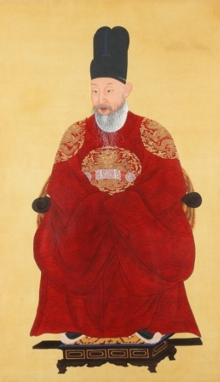King Yeongjo
| Yeongjo | |
|---|---|
| King of Joseon | |
 |
|
| Reign | 16 October 1724 – 22 April 1776 |
| Predecessor | Gyeongjong of Joseon |
| Successor | Jeongjo of Joseon |
| Born |
31 October 1694 Changdeok Palace, Kingdom of Joseon |
| Died | 22 April 1776 (aged 81) Gyeonghui Palace, Kingdom of Joseon |
| Burial | Wonneung, Guri, Gyeonggi |
| Spouse |
Queen Jeongseong Queen Jeongsun |
| House | House of Yi |
| Father | King Sukjong of Joseon |
| Mother | Royal Noble Consort Suk |
| Korean name | |
| Hangul | 영조 |
|---|---|
| Hanja | 英祖 |
| Revised Romanization | Yeongjo |
| McCune–Reischauer | Yǒngjo |
| Pen name | |
| Hangul | 양성헌 |
| Hanja | 養性軒 |
| Revised Romanization | Yangseongheon |
| McCune–Reischauer | Yangsŏnghŏn |
| Birth name | |
| Hangul | 이금 |
| Hanja | 李昑 |
| Revised Romanization | I Geum |
| McCune–Reischauer | Yi Kŭm |
| Courtesy name | |
| Hangul | 광숙 |
| Hanja | 光叔 |
| Revised Romanization | Gwangsuk |
| McCune–Reischauer | Kwangsuk |
Yeongjo of Joseon (31 October 1694 – 22 April 1776, reigned 16 October 1724 – 22 April 1776) was the 21st king of the Korean Joseon Dynasty. He was the second son of King Sukjong. His mother was Consort Suk of the Choe clan. Before ascending to power, his name was Prince Yeoning. In 1720, a few months after the accession of his older brother, King Gyeongjong as the 20th King, Yeoning became the Royal Prince Successor Brother (wangseje, 왕세제). This induced a large controversy between political factions. Nevertheless, four years later, at the death of Gyeongjong, Yeongjo ascended the throne.
Yeongjo's reign lasted 52 years and was marked by his persistent efforts to reform the taxation system of Joseon, rule by Confucian ethics, minimize and reconcile the factional fighting under his "Magnificent Harmony" Policy (Tangpyeong, 蕩平, 탕평). His reign was also marked by the highly controversial execution of his son, Prince Sado, in 1762. In spite of the controversies, Yeongjo's reign has earned a positive reputation in Korean history due to his sincere efforts to rule by Confucian virtue.
In 1720, his father King Sukjong died and Crown Prince Yi Yun, Sukjong's eldest son, ascended to the throne as King Gyeongjong, at the age of 33. When Sukjong died in 1720, he supposedly told Yi Yi-myoung to name Yeoning-gun as Gyeongjong's heir, but in the absence of a historiographer or scribe, there was no record .
During his time there was infighting and resentment for his low-born origins. The Noron faction (노론, 老論) of the bureaucracy pressured King Gyeongjong to step down in favor of his half-brother Prince Yeoning (the future King Yeongjo). In 1720, two months after the King's enthronement, Prince Yeoning was installed as Royal Prince Successor Brother (wangseje, 왕세제, 王世弟). This aggravated the power struggle and led to a great massacre, namely the Shinim literati purges (신임사화, 辛壬士禍). The Norons sent messages to the king to no effect while the opposing Soron faction (소론, 少論) used this to their advantage – claiming the Noron were trying to usurp power and subsequently getting their rival faction removed from several offices.
...
Wikipedia
